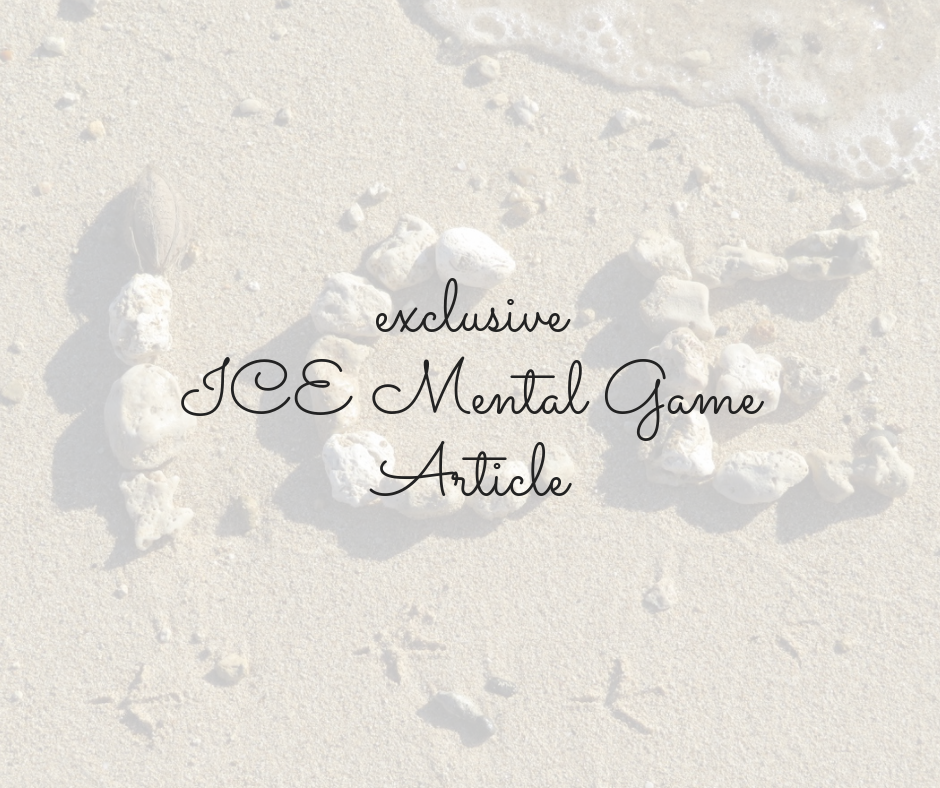“So, how was your last competition?” Mentalgamecoach asks.
“It went pretty well,” Skatergirl says. “I fell on my triple flip double toe combination during my long program, but I did everything else.”
“That’s great,” Mentalgamecoach says. “Now that it’s been a week, let’s review the competition. What are two thing you thought you did well, mental game wise?”
“Hmm…” Skatergirl says, drumming her fingers on her desk. “Two things I did well…”
Skatergirl wracks her brain. It’s always been easier for her to come up with the things she didn’t do well than the things she did.
“I know,” Skatergirl says. “I used that technique you taught me to refocus before my short program.”
“What happened?”
“Right after I stepped onto the ice for my short program, I started feeling super nervous. I was so nervous, my whole body was shaking.”
“What did you do?”
“I skated over to the boards and took a sip of water. Then, I scrunched my toes up really hard and focused on how they felt.”
“Did it help?”
“Yeah, when I finished my mind was clearer and I wasn’t shaking as much. I was still nervous, but it wasn’t as bad.”
“That’s great,” Mentalgamecoach says, giving Skatergirl a thumbs up. “What’s the second thing you did well?”
“I was pretty shaken up going into my triple lutz after the fall on my combination. I was worried that my program was going to be a disaster like last competition. But, I managed to refocus my mind on the feeling in my arms on the takeoff, and while the landing wasn’t pretty, I managed to stay on my feet.”
Mentalgamecoach’s Tips
Distractions are an inescapable part of everyday life. Whether you like it or not, you’ll have to deal with them at some point.
Dealing with distractions is difficult, and at competition it’s even harder. At competition, you don’t have time to stop and think. You have to be able to refocus on the fly and continue on with your performance.
Skatergirl uses two different techniques to refocus herself, each at a different point in the competition. She uses the first one before her skate, when she’s standing at the boards waiting for the announcer to call her name. And, she uses the second one during her program, on the entrance to her triple lutz.
When she’s standing at the boards waiting for the announcer to call her name, Skatergirl scrunches her toes in her boots and focuses on how they feel. When she does this, her mind is brought back to the feeling in her body.
Distractions can cause nerves, and nerves can cause tension. This leads to slower reaction times and decreased performance.
When Skatergirl is focused on the feeling in her toes, her mind can’t focus on anything else. This focus helps to take the edge off of the nerves.
Try it for yourself. Stop whatever you’re currently doing and scrunch your toes up really hard.
Now, really focus on your toes. Feel the texture of the floor. Feel the tension in your muscles.
Stop.
What happened? Did all of your other thoughts disappear?
That’s why this technique works. When you focus on the feeling in your toes, all the other thoughts disappear. And, when those thoughts disappear, they take a lot of the nerves along with them.
Skatergirl uses a similar technique on the entrance to her triple lutz, except this time she focuses on the feeling in her arms instead of her toes. This does the same thing as the other technique. It brings her back into the feeling of her body, which focuses her on the present, allowing her to execute the jump.
Remember, mental game techniques are just like any other skill. They take time to master.
Don’t expect to be able to use these techniques perfectly the first time you try them. It takes a lot of practice before you can start using them efficiently.
If you want to use these techniques, start by doing them everyday during practice. Do them before your run throughs, or whenever you get a drink. Do it before each repetition of a difficult element.
That way, by the time you get to your next competition, you’ll already have a lot of repetitions under your belt.
Mental skills training can make a difference because it can help you access what is already there during competition and practice.
Start here: download “Confidence Myth Busters,” a complimentary eBook and make a change.

